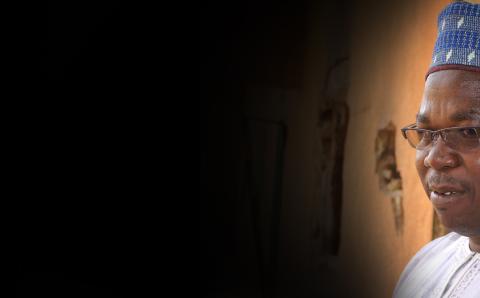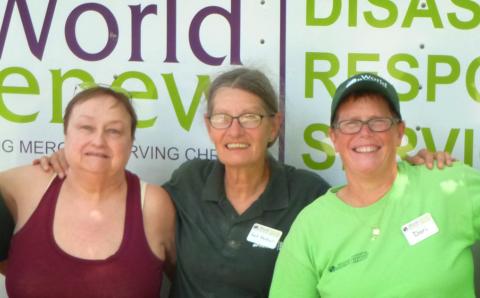Elephant in the Room
Re “The Elephant in the Room”: I am a CRC member; most of my friends are also. But a widespread discussion of same-sex marriage is seldom brought up. Is this happening in Grand Rapids? Churches should air what the Bible reports on the subject. I attended synod at least three times and was on my classis Home Missions committee for a number of years. It seems the CRC and I are on an opposite course of thought. But I do see much good in the church.
—Robert Wunderink
Roselawn, Ind.
CRC Ministry to Navajo
I take exception to the judgmental language in the report regarding the Doctrine of Discovery task force (“Synodical Committee Rejects Doctrine of Discovery, Criticizes CRC MInistry to Navajo”).
I grew up in Zuni in the 1940s and 50s, the child of one of those missionaries. I viewed flawed people who brought the good news with love and compassion. Throughout history we see imperfect people (Moses, Jonah, the prophets) bringing God’s message and accomplishing his purposes.
Would the Navajo/Zuni be better off today if the missionaries [had] never brought them the good news? I think not. Today many of them are leaders in the churches, schools, and tribal governments.
We definitely made mistakes. We have apologized, and, with God’s help, will continue to flourish.
—Carol De Vries Carlson
Taylorsville, Utah
Movies
I recall a similar experience when I was young (“Why Dad Sent Me to the Movies”). But when my parents learned of it the result was the opposite of them condoning it.
Three significant things occurred later in life: (1) I encountered and considered the argument for atheism but concluded that an Intelligent Being created the universe; (2) I became a Christian Reformed pastor; (3) I taught a course for three years with an atheist as part of the continuing ed program at Iowa State University on whether there is a God, and what difference it makes.
Life continues to be interesting. I look forward to receiving The Banner.
—Bill Brouwers
Grand Rapids, Mich.
Same-Sex Marriage Report
The committee’s report is flawed (“Michigan Classis Accepts Study Report on Same-Sex Marriage, Offers It to Synod 2016”). If we accept gay behavior and relationships, then we are going to have to figure out if and why other sexual behaviors and relationships outside of traditional marriage are wrong. . . . The more we “accept” and “celebrate” our culture’s pathologies, the more vulnerable we and our children are to evils that harm us spiritually, emotionally, and physically because they contradict the way our Creator made our minds, bodies, and souls. We can only hope that God will be as merciful to us if we are disobedient in this area as he has been to us in other areas where we were disobedient in the past. God bless us all.
—Raymond Opeka
Grand Rapids, Mich.
The study committee of Classis GR East makes very clear that we must understand some of the Scripture passages related to homosexuality (eg. Rom.1; 1 Cor. 6) (“Michigan Classis Accepts Study Report on Same-Sex Marriage”).
It is so very easy for us to come to a “black or white” position by simply quoting Scripture while Scripture itself is subject to and in need of interpretation. Surely homosexual activity of “God-lovers” is not what Paul describes in the above passages, for [people who are same-sex oriented and who want to be part of the fellowship of believers] very much want to serve God. Their understanding of and loyalty [to the Reformed faith] is contrary to the evil mess and wrongdoing described by Paul when people turn their backs to God. These evil attitudes do not include the sincere Christian who knows his or her sexual orientation.
It is my sincere prayer that Synod 2016 will consider the merit and clarification provided by this report.
—Henry Numan
Vancouver, B.C.
Calling All Shepherds
This opinion by Gertrude Pool is something I so agree with (“Where Have All the Shepherds Gone?”). The CRC seems to be saying more and more that the congregation is responsible for visiting the sick and the lonely. But I also feel we need a shepherd in our midst. When church members feel that no one cares, it is very easy to walk away from church.
—Corry Horsman
Edmonton, Alta.
I felt compelled to respond (“Where Have All the Shepherds Gone?”). Sadly the article implies that a pastor isn’t working hard enough now that they may not be “preaching twice a Sunday.”
Imagine a congregation where church members, small groups, elders, and pastors all took the time to lovingly and graciously shepherd each other. Such a dynamic would create healthy pastors and thriving church communities.
We can’t put too much weight on one member (the pastor) of a church. After all, our denomination believes in the priesthood of all believers. Let’s support our pastors, encourage them, pray for them, befriend them, and not just overload them with expectations.
—Beverly Roorda
Beamsville, Ont.
Interfaith Dialogue
Much as I appreciated the articles written by Mast (“Apocalypse Now”) and Vander Zee (“The Trinity”), both do raise a very timely and extremely urgent question. We live in a time of increasing interfaith dialogue, not to compromise or to find common denominators, but to listen to and learn from each other. We should, therefore, distinguish between biblical (Holy Book) language and theological language, be it Christian, Muslim, or the theological language of any other faith community. The word “Trinity” and its derivatives are strictly theological. The use of theological language makes any meaningful dialogue with other faith communities, especially Jewish and Muslim, very difficult, if not impossible.
—Simon Wolfert
Surrey, B.C.
Joining the Conversation
It seems to me that what is being argued here (“Joining the Conversation”) is that personal experience is required to inform our moral judgement on homosexuality. And if someone does not know the challenges faced by an individual with same-sex attraction, or is not able to identify with their struggles, there is no ability to make a sound judgement on this issue, let alone permission to join the conversation.
Hearing the struggles of those who identify as gay or those with same-sex attraction can no doubt inform us in how to respond with compassion and equip us with empathy; let’s continue that conversation. But when it comes to a moral judgment, should personal experience continue to interpret that judgment? Wouldn’t the more biblical worldview be that it is God through his Word that has the authority to interpret our personal experience?
As followers of Christ, we agree that any opinion not offered in love, grace, and compassion is most certainly wrong. But just as importantly, any opinion, judgment, or decision from any other place that contradicts the biblical teaching on sexuality will also, most certainly, be the wrong one.
—Anthony Eisses
Lacombe, Alta.









